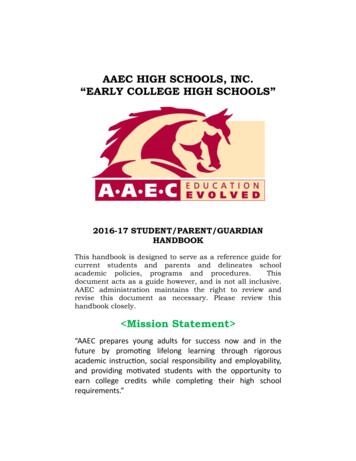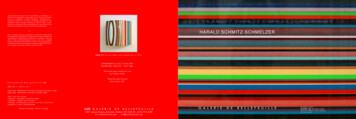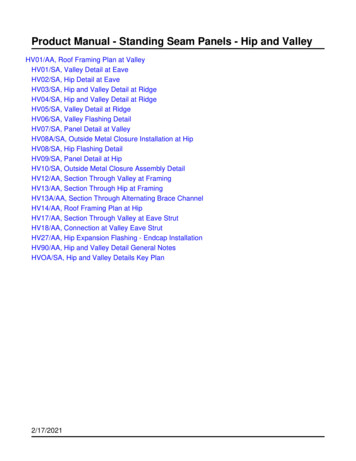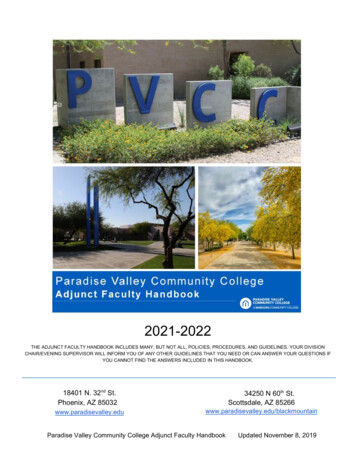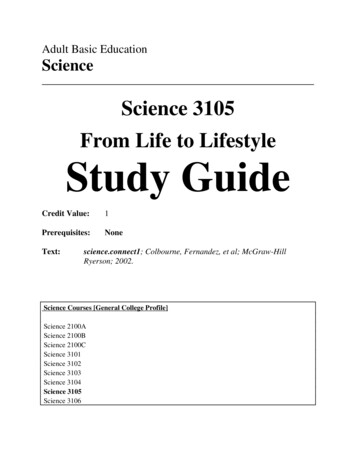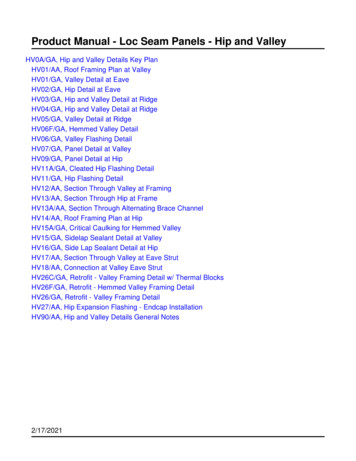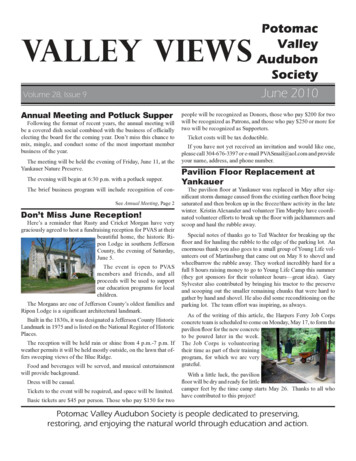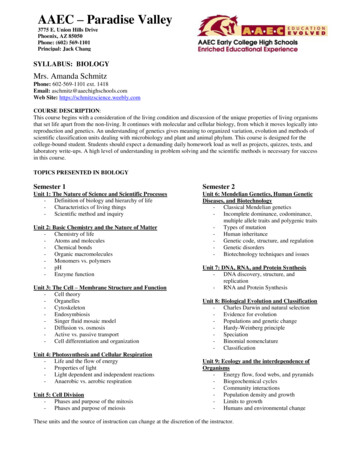
Transcription
AAEC – Paradise Valley3775 E. Union Hills DrivePhoenix, AZ 85050Phone: (602) 569-1101Principal: Jack ChangSYLLABUS: BIOLOGYMrs. Amanda SchmitzPhone: 602-569-1101 ext. 1418Email: aschmitz@aaechighschools.comWeb Site: https://schmitzscience.weebly.comCOURSE DESCRIPTION:This course begins with a consideration of the living condition and discussion of the unique properties of living organismsthat set life apart from the non-living. It continues with molecular and cellular biology, from which it moves logically intoreproduction and genetics. An understanding of genetics gives meaning to organized variation, evolution and methods ofscientific classification units dealing with microbiology and plant and animal phylum. This course is designed for thecollege-bound student. Students should expect a demanding daily homework load as well as projects, quizzes, tests, andlaboratory write-ups. A high level of understanding in problem solving and the scientific methods is necessary for successin this course.TOPICS PRESENTED IN BIOLOGYSemester 1Semester 2Unit 1: The Nature of Science and Scientific Processes- Definition of biology and hierarchy of life- Characteristics of living things- Scientific method and inquiryUnit 6: Mendelian Genetics, Human GeneticDiseases, and Biotechnology- Classical Mendelian genetics- Incomplete dominance, codominance,multiple allele traits and polygenic traits- Types of mutation- Human inheritance- Genetic code, structure, and regulation- Genetic disorders- Biotechnology techniques and issuesUnit 2: Basic Chemistry and the Nature of Matter- Chemistry of life- Atoms and molecules- Chemical bonds- Organic macromolecules- Monomers vs. polymers- pH- Enzyme functionUnit 3: The Cell – Membrane Structure and Function- Cell theory- Organelles- Cytoskeleton- Endosymbiosis- Singer fluid mosaic model- Diffusion vs. osmosis- Active vs. passive transport- Cell differentiation and organizationUnit 4: Photosynthesis and Cellular Respiration- Life and the flow of energy- Properties of light- Light dependent and independent reactions- Anaerobic vs. aerobic respirationUnit 5: Cell Division- Phases and purpose of the mitosis- Phases and purpose of meiosisUnit 7: DNA, RNA, and Protein Synthesis- DNA discovery, structure, andreplication- RNA and Protein SynthesisUnit 8: Biological Evolution and Classification- Charles Darwin and natural selection- Evidence for evolution- Populations and genetic change- Hardy-Weinberg principle- Speciation- Binomial nomenclature- ClassificationUnit 9: Ecology and the interdependence ofOrganisms- Energy flow, food webs, and pyramids- Biogeochemical cycles- Community interactions- Population density and growth- Limits to growth- Humans and environmental changeThese units and the source of instruction can change at the discretion of the instructor.
MATERIALS REQUIRED Pens, blue or black ink for assignments and other colors for gradingPencilsCollege-ruled notebook paperRuler, displaying centimeters and inches1.5” D-ring view binderSet of 5 tab dividers for binderColored pencilsScissorsGlue bottle or tape dispenserOne (1) reams of 20-lb. (standard) copy paper (500 sheets)*One (1) large box of Tissues**These items will be collected and kept in classThese items will NOT be supplied by the instructor. If the student fails to have his or her supplies, they may ask anotherstudent.DAILY REQUIREMENTS:All students will be required to keep a 3-ring binder with all of their classroom materials in the binder. This binder willhold the student’s vocabulary booklets, notes, classroom assignments and activities, labs, reviews and assessments. Thisnotebook will be graded at the end of every unit.BELL TO BELL INSTRUCTION:Class begins promptly with bell work (review of previous day’s concept or introduction of new concepts), which leads intoinstruction of daily concept. Practice of these concepts occurs in a variety of activities that end in class reflection of learnedmaterial. Each unit taught includes the following activities: hands-on-lab, note taking, reading with written response,viewing videos with written response, group interaction, quizzes and exam.ATTENDANCE:One of the major factors that contribute to poor grades is student absence.Per student handbook: “In order to receive credit for the semester, 90% attendance is required in each assigned class.Classes missed due to school approved activities are excluded.” Please see handbook for details. While some absencesare unavoidable, it is the recommendation of the instructor and school that you make every attempt to limit being absentfrom class. Work make up policy will be described below.TARDIES:A “tardy” is defined as; a student entering the room AFTER THE BELL HAS BEGUN TO RING. Students who are tardyto class will need to bring a pass in order to be admitted.Lab Days: If a student is tardy on a lab day and has missed the directions/instructions, it would cause a disruption of thelearning environment for the other students in the class in order to get them caught up. The student will have to makearrangements with the instructor to come in after school to get the lab completed. Some labs or activities will not be able tobe made up due to material, tool, or technological availability. In this case, an alternate assignment will be made available.CLASSROOM CONDUCT RULES - a student does not have the right to disrupt the learning of another student.Therefore the following procedures and rules are in place to ensure a positive learning environment for yourstudent.This classroom has three main expectations.1. Be respectful.a. Remove hats, sunglasses, and earbuds when entering the building/classroom.b. No personal grooming in class (applying make-up, doing hair, body spray, etc.)c. Each student is responsible for maintaining the neatness and cleanliness of their work area (What is infront of, behind, above, and below his/her table and chair).d. Will respect all school property. (No graffiti on desks, in books, on walls, whiteboards, damage toprovided supplies, etc.)
2.3.Be responsible.a. Students should be ready to work upon entering the classroom. Come into class quietly and sit in yourassigned seat. Cease all outside conversation upon entering the room.b. Students are expected to consume food, snacks, candy, and drinks before entering class. If these itemsare out during the class period, the teacher may ask the student to put the item away, confiscate the item,or trash the item. The only exception is water in a container with a lid, which is encouraged.c. Electronic equipment (mp3 players, tablets, cell phones, etc.): Students must receive specific permissionfrom the teacher to use cellular phones, laptops and other electronic devices in class and do so at theirown risk.d. Students must have School ID on them at all times.Be kind.a. Will show respect to all staff, instructors (teacher/substitute), and students (ALL). (Nodefiance/bullying/name-calling)b. Will use appropriate language at all times. (No profanity in any language)CONSEQUENCESFrom time to time students will break rules, either intentionally or unintentionally and as a result, disrupt the learningenvironment. It is the policy of this instructor, the school and federal mandate that no student has the right to disrupt thelearning of others. Therefore, the following steps will be followed in response to disruption:1. The student will be warned politely by the instructor, either verbally or through silent cues.2. The student will be warned formally by individual conference outside the class.3. The student will be removed to another classroom for the remainder of the period and a call will be made to theparent or guardian.4. In the event of severe disruptions, the student will be removed to the office.GRADING SYSTEMGENERAL: Your grade in this class will depend on your performance. I do not GIVE grades, I grade assignments; thestudents total is, a reflection of the quality of work put forth BY THE STUDENT.BRING SUPPLIES TO CLASS: Students must have student materials to complete assignments every day in every class.PERFORMANCE: You will be asked to stay up on your studying each day to be able to complete assignments at showthat you are mastering the material being taught in class. Completion of the work is paramount to your grade and yourunderstating of the core material that will help you at the end of the semester and in your future science classes.TEAM WORK: Science, however, is a team work endeavor. Part of your grade will depend on how you act in a team.Participation, cooperation, providing assistance to others, and being in general a decent human being will all be take in toaccount when grades are given for labs and presentations. Most assignments are also best done in groups, where dialog andcritical thinking are used to draw conclusions from gathered data. Therefore, in science, students are encouraged to worktogether. The exception to this are during tests or quizzes, where student communication WILL result in loss of credit.GRADING: You will have many different kinds of assignments. All modeling activities are based on state standards. Sincethis is a hands-on approach, concepts missed because of absences will be difficult to make up, since class discussion and inclass activities cannot be done on an individual basis. It is once again stressed that you do not miss class unless it is a severeemergency.If a student misses an assignment, a “mi” will be placed in the gradebook and calculated as a “0” for the assignment. Ifthe student makes up the assignment, the grade will be updated once the assignment is scored. Current assignments takeprecedence over make-up work when scoring. Therefore, a make-up assignment will not be scored immediately and maytake some time to be updated.PORTFOLIO/BINDER: All work (Notes, Assignments, Quizzes/Tests, Labs and Reports) will be placed in a portfolio(binder). This will be set up according to provided guidelines and maintained by the students daily. It will include the use ofa table of contents, and be maintained in a neat and organized way.COMPLETING ASSIGNMENTS / TURNING THEM IN ON TIME: The single most important thing that you do is tocomplete assignments to the best of your ability and on time. All assignments must be completed to receive a grade. Ontime is considered to be at the beginning of class on the due date. Any time after this is considered late.
MAKE UP POLICY: It is the student’s responsibility to check class resources for any notes or assignments they missedduring an absence. These resources may include the class website, work folders in the classroom, homework or agendaboards, or ask another student what they have missed. If they cannot get the information from those sources, the studentshould see the teacher before or after school for help getting caught up.Assignments missed due to absence are entered into the gradebook as “abs” and is calculated as a “0.” Once the studentmakes up the work, the zero will be replaced with the student’s score. Students have the number of days missed tocomplete missing work before it is considered late. For example, if the student misses 3 days, the student will have 3 daysto complete and turn in all missed work.Under normal conditions, late work is unacceptable and should not be graded. However, unforeseen situations occur.Therefore, students may turn in late assignments or NON-presentation type projects, provided they meet the criteria below.CRITERIA FOR LATE ASSIGNMENTS AND ASSIGNMENT RE-SUBMITTAL: Students may re-submit ormake up assignments anytime within 1 WEEK after the due date. Late work turned in before the end of that week willonly receive half of the credit earned.PROFESSIONAL POINTS: This assignment accounts for student participation, attendance, classroom etiquette,behavior, and student preparedness. This is calculated each day and entered weekly. Tardies affect this grade.TUTORING PERIOD: Tutoring is available as needed by students. Tutoring will be held after school (2:30 to 3:15) onTuesday through Thursday.ASSESSMENTS: Assessments will be given almost every week in the form of quizzes and tests. There will by periodicallabs, papers and portfolio checks as well.GRADE CHECKS: Grade checks will be sent home the beginning of each week (typically Mondays) and returned with aguardian’s signature by Friday. Expect a grade check every week unless noted by teacher on class website. Thisassignment cannot be made up. If a student is absent the day grade checks are given, the student is responsible for seeingthe teacher for their grade check the day they return to class. ALL STUDENTS ARE EXPECTED TO HAVE THEIRGRADE CHECK SIGNED EVERY WEEK.UNIT EVALUATION BREAKDOWN:Final Exam20%(District Post-Test, & Course Final Exam)Assessments 40%(Labs, Presentations, Projects, Tests & Quizzes)Assignments 40%PERCENTAGES FOR INDIVIDUAL SCORES100.00 – 90.00A89.99 – 80.00B79.99 – 70.00C69.99 or lessF(Class work, Assignments, & Professional points)Semester Grade100%WELCOME TO THE CLASS! LET US MAKE THIS AN EXCITING AND PRODUCTIVE YEAR!PLEASE HAVE YOUR STUDENT PLACE THE ENTIRE PACKET IN THEIR PORTFOLIO FOR A GRADE.RETURING THIS ACCOMPANYING SIGNATURE PAGE IS ONE OF THE FIRST SCORED ASSIGNMENTS FORYOUR STUDENT.
AAEC – Paradise Valley3775 E. Union Hills DrivePhoenix, AZ 85050Phone: (602) 569-1101Principal: Jack ChangBIOLOGY SYLLABUS ACKNOWLEDGEMENTPLEASE HAVE YOUR STUDENT PLACE THE ENTIRE SYLLABUS IN THEIR PORTFOLIO FOR AGRADE. RETURNING THIS COMPLETED SHEET IS ONE OF THE FIRST SCORED ASSIGNMENTSFOR YOUR STUDENT.ACKNOWLEDGMENT OF RECEIPT OF SYLLABUSPERIODWe have received this syllabus for Biology and will comply with the course rules and expectations ofthe class. I will keep up on my students’ grades as they are given weeklyPRINT STUDENT NAME (last, first):STUDENT ----------------PRINT GUARDIAN NAME (last, first):Do you have a Parent VUE account, to see all your children’s grades within the district from onelogin? YES NO (Please ask for your account name and initial password in the front office)Did you subscribe to the FREE text message or email reminder service for this class? YES NO (Signup information is at the bottom of the page)PARENT SIGNATURE:For FREE text message reminders of important class due dates, text the period code for your child’sclass to 81010.Biology: @schmitzbio
Weekly Grade Check (BIOLOGY)This document will be sent weekly with my signature and the student’s grade for you, the guardian, to signand have your student return each week. Please ask to see it weekly!Teacher Contact Information: (email) aschmitz@aaechighschools.com (phone) 602.569.1101 x1418Date of Grade:Grade Teacher SignatureParent SignatureName inGradebook08/12/2019Progress 108/19/2019Progress 208/26/2019Progress 309/03/2019Progress 409/09/2019Progress 509/06/2019Progress 609/23/2019Progress 709/30/2019Progress 810/07/2019Progress 910/14/2019Progress 1010/21/2019Progress 1110/28/2019Progress 1211/04/2019Progress 1311/12/2019Progress 1411/18/2019Progress 1511/25/2019Progress 1612/02/2019Progress 1712/09/2019Semester 1 FinalProgress
A high level of understanding in problem solving and the scientific methods is necessary for success . AAEC - Paradise Valley 3775 E. Union Hills Drive Phoenix, AZ 85050 Phone: (602) 569-1101 Principal: Jack Chang . It is the policy of this instructor, the school and federal mandate that no student has the right to disrupt the learning of .
